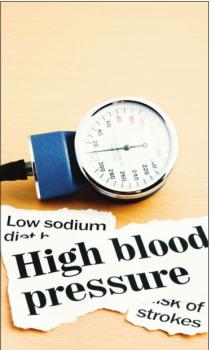
BLOOD PRESSURE
Q
I get low blood pressure after I eat a meal. It makes me a little woozy. What can I do about it?
A.
This is a senior malady called, “postprandial hypotension.” When you eat, blood pours into your digestive system. To maintain your blood pressure, your heart pumps more often and your blood vessels constrict. But these compensatory mechanisms don’t work for some people.
To help prevent postprandial hypotension, eat small portions several times a day and limit high-carbohydrate foods such as potatoes, rice, pasta and bread.
In many instances, low blood pressure isn’t serious. However, it is important to see your doctor if you have hypotension symptoms, because they sometimes can point to serious problems. Chronic low blood pressure may increase the risk of Alzheimer’s-type dementia in some older adults.
DOG BITES
I am a senior who is afraid that my in rmities make me a target for
Q
dogs. Am I being paranoid? What should I do when confronted by a dog?
A.
Seniors are bitten by dogs more than any other group except children. Older people are more prone to being bitten by an aggressive dog because they tend to be slower and weaker than younger adults.
Here are some tips from the experts on how to avoid being attacked by a dog:
• Don’t look a dog straight in the eye.
This is provocative.
• Do not run away from or past a dog.
This can make them aggressive and want to chase you.
• Never go up to a dog you don’t know and try to get friendly, especially if the dog is behind a fence, tethered or in a parked car.
• If an unfamiliar dog comes up to you, stand still. Most of the time, the dog will sniff you and then walk away.
• Never bother a dog that is eating or
sleeping. And stay away from a mother tending to her litter.
• If you’re threatened by a dog, don’t yell. Respond calmly. In a commanding voice, tell the dog to go away. Try to stay still until the dog leaves or back away slowly.
• If you are attacked, give the dog an object, such as a jacket or tote, to bite. If you are knocked down, roll yourself into a ball and lie still. Cover your head and face with your hands.
BURSITIS
Q
Does bursitis get worse with age?
A.
Yes. Bursitis is in ammation of a bursa, which is a small sac lled with uid. We each have about 160 of these bursae, which act as shock absorbers and grease for our joints. They are buffers between bones and overlapping muscles or between bones and tendons/skin. When bursae become in amed, they can ache.
While repetitive motions are the usual culprits in bursitis, simple pressure can cause in ammation, too. A couple of examples: Pushing a vacuum cleaner can give you bursitis in your elbow. But sitting on a hard surface for a long time can in ame the bursa over a bone in your buttocks.
You can usually take care of bursitis yourself. Rest the affected joint. An ice pack will reduce swelling. To reduce pain and in ammation, take a nonsteroidal anti-in ammatory such as ibuprofen or aspirin. It usually takes a week or so for bursitis to go away.
You should go to your doctor if the symptoms don’t subside after 10 days; you have a fever; there’s excessive swelling, redness, bruising or a rash in the affected area; pain is sharp, shooting or disabling; you have a medical condition or you take drugs that may increase your risk of an infection.
Fred Cicetti is a freelance writer who specializes in health. He has been writing professionally since 1963. Before he began freelancing, he was a reporter and columnist for three daily newspapers in New Jersey. Email questions to [email protected].